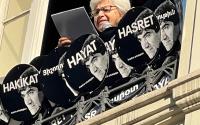Published on Tuesday, May 31, 2005 by the Daytona Beach News-Journal (Florida) Pierre Tristam
I was 10, my two brothers a few years older. We were settling down in the television room to watch the last episode of a miniseries, an Italian production of "The Odyssey" with -- I have no idea why I should remember this 30 years later -- Irene Papas, the Greek actress, as the beautiful Penelope. We had watched the series once already, which made anticipating the climactic scenes that much more exciting: Ulysses finally returning home, beating up on the suitors who'd fouled up his estate then sending them to hell (literally), and reclaiming Penelope by firing his arrow through 12 axes as only he could. The bit about Ulysses reuniting with his father Laertes wasn't yet something to pull at a 10-year-old's heartstrings. My father would be dead a year later, but at that moment he was his invulnerable self in the living room, entertaining a few old friends with my mother and his baritone stories. He'd granted us a special treat. It was a school night. Television would normally be forbidden. For Homer, he made an exception.
We never made it past the opening credits. Ulysses' ship was sailing to Ithaca on the Mediterranean's bluest serenity (we had a black and white TV but I'd grown up by the same sea) when the loudest blast I ever heard shook our fourth-floor apartment and threw me off the couch. I didn't feel myself being thrown off. One moment I was watching Ulysses' ship, the next I was on all fours, bawling, my ears ringing with the sound of a train whistling in a tunnel and the rest of me paralyzed by fear as I'd never experienced fear before. I don't know what was more incomprehensible -- having been shoved to the floor without anyone touching me, or the shock of the explosion, which my brain had no way of processing as an explosion, having never known anything remotely resembling what had just happened. The world had, for a split second of black that I also remember, ended and started up again, off its hinges.
It was late spring, 1975. We were living in Beirut. What would come to be known as the civil war had begun a month or so earlier with nothing more bothersome than a week's worth of distant shooting. When it was over we figured like everyone else that it was over for good. The blast shattered that illusion, and every glass pane on the southern face of the house, including the television room. We learned later that it wasn't a very serious device, nothing more than a few sticks of dynamite someone set off in the median on the boulevard below, as if for kicks. Militiamen did that sort of thing often in the early days of the war, like dogs marking their territory. In this case no one got hurt. My father, like me, was thrown to the floor by the concussion but lost nothing more than his whiskey. Our landlord downstairs, who looked and normally trembled faintly like Robert Byrd, came upstairs shaking from head to foot, maybe to assure himself that his tenants would still be paying him rent despite the damage, or to have a drink. He was Muslim, he didn't officially drink, we were Christians, we could help. I wouldn't be surprised if my mother gave me a shot, too.
The glass panes were repaired that week but the war returned, and with it unneighborly snipers and more bombings, but nothing compares with that first one. It had shattered more than glass. Last week I could smell this small incident all over again when I read the account of a New York Times stringer in Baghdad describing how he'd walked out of a restaurant a minute or two before it was bombed -- the ringing in the ear, the shattered glass, the stunned look on people's faces, and that fear mixed with gratefulness that one is still able to feel the fear, that one is still alive, but that words can't describe.
Like so many bombings in Baghdad, that one was lethal to many. Mine in comparison was so insignificant in the scheme of things, I should be embarrassed to recall it. But it was on that night in Beirut that I lost a sense of trust in my surroundings that I've never regained. It couldn't matter anymore how near my father was to protect me, how thick the stone walls, how calm the environment: any sense of security was a matter of faith, and I had lost mine. The strange thing is that I've never wanted that faith back. I consider myself lucky to have lost it as early as I did, and rue those weak moments when I feel it creeping back. In that faith is the seed of an arrogance that assumes too much about what we can control and concedes too little about what we can't.
Since September 2001, I've kept Faulkner's famous line from "Absalom, Absalom!" pasted on the rim of my computer screen, the one about "that dream state in which you run without moving from a terror in which you cannot believe, toward a safety in which you have no faith." It is one of the most stoic, reassuring lines in literature. And it is my memorial to that Odyssean night in Beirut, my daily pledge to take nothing, ever, for granted.
Tristam is a News-Journal editorial writer. Reach him at [email protected].
http://www.commondreams.org/cgi-bin/print.cgi?file=/views05/0531-28.htm






